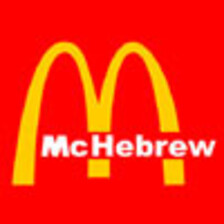The Electronic Intifada 6 September 2001
A few days ago I received an email declaring that McDonald’s Corporation, the US fast food giant, would be donating money to Israel to fight against the Palestinians. In imprecise English the email said:
“McDonald’s Restaurants in the USA will give their Saturday income to the ‘Israeli Occupation Authority’ on a weekly basis to ‘help’ against the Palestinians’ ‘violence’ and ‘terrorism.’”
The email pleaded with readers to “Act now and be a member of the Intifada” and of course to be sure to forward the message to “all the addresses in your address book.”
This message, which came with no date, no source and unsigned, appeared to me to be an obvious hoax. But it was not long before I started to receive it from every direction and from list-servs concerned with Palestinian rights. A few of my correspondents were skeptical, but I received it from many people who were simply forwarding it as if it were real. I even received a slightly different version signed by “Palestine Embassy, Ankara — Turkey.” I do not think that the message originated there since I had already received it a few days before from other sources. Rather, like many others, the PLO office in Turkey probably simply read it and enthusiastically forwarded it on without further thought.
There are several very clear reasons why any person ought to be able to tell that this message is a fake. But before I get to that, let’s make certain. I contacted McDonald’s Corporation’s global headquarters, which is based in Oakbrook, just outside Chicago and sent them two version of the email I had received. In a statement faxed to The Electronic Intifada on September 5, Corporate Spokesperson Anna Rozenich said:
“The rumor about McDonald’s USA and “donations” to Israel is ridiculous. It is absolutely untrue.”
I contacted McDonald’s in an abundance of caution, but it was always obvious that the email claiming that McDonald’s is handing money to Israel is a hoax not least because:
All in all, it just didn’t add up. Pro-Palestinian activists whose memory goes back to before the current Intifada might also recall that in 1998 an international grassroots campaign forced McDonald’s rival Burger King to withdraw its name from a restaurant that had been built in the illegal Israeli settlement of Maale Adumim in the occupied West Bank. At that time it was widely publicized that in contrast to Burger King, McDonald’s had pointedly refused to open restaurants in the occupied territories.
McDonalds-Israel owner and general manager, Omri Padan, said in an interview published in the Israeli newspaper Ha’aretz on January 15, 1998 that,
“McDonald’s-Israel neither did nor will open a branch at any Israeli settlement beyond the Green Line [the 1967 borders]. Already when I was the general manager of Kitan Textiles I told the board I would resign immediately if they move to open a plant on the West Bank. I have the privilege of not needing to compromise on my principles.”
It is impossible to tell who started this email rumor. But it would not have gone as far as it has if so many people were not ready to believe anything they read, just because it shows up in their inbox. The Internet has proven to be an incredibly valuable tool for pro-Palestinian activists. But technology can never substitute for our judgment and simple common sense. It is a very worrying sign if we can be so easily distracted or sent into a frenzy by such obvious misinformation. The well-documented facts about Israel’s brutality against Palestinians and US support for it, are scarcely known or understood in the United States. Surely we would be making far better use of our time and the Internet, educating others about the truth rather than jumping at every piece of bait that appeals to our sense of grievance and darkest fears.
For activists to be truly effective, we must cultivate not only our most powerful sense of enthusiasm, but also our skepticism, critical faculties and credibility.




